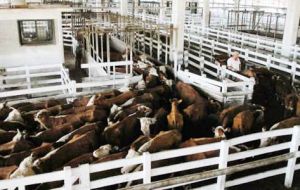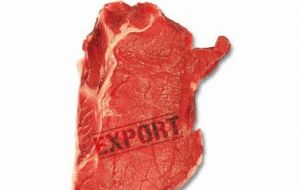MercoPress. South Atlantic News Agency
Argentina absorbs 93% of beef production, exports tumble behind Paraguay
 Plenty of cheap beef for the Argentine domestic market, but for how long?
Plenty of cheap beef for the Argentine domestic market, but for how long? Argentine government trade restrictions on overseas sales of beef have turned Paraguay into Mercosur third largest exporter behind Brazil and Uruguay. The first place last year belonged to Brazil with exports of 1.3 million tons; Uruguay, 350.000 tons; Paraguay, 210.00 and finally Argentina.183.000 tons.
The poor international performance of Argentina, once the world leading beef exporter is attributed to the measures first implemented by President Nestor Kirchner in 2006 and continued by her wife and current head of state.
To the 15% export levy imposed in 2006 must be added the closing of markets, price controls, and mandatory sale of beef to the domestic market at non profitable prices and the mechanism of rotating export permits only authorized by Domestic Commerce Secretary, Guillermo Moreno. To this must be added the monetary restrictions which in effect mean Argentine exporters receive 4 Pesos for each dollar compared to 5.25 and 8.90 Pesos in the official and parallel markets.
“Because of government intervention Argentina has lost export markets and the exporters’ sector profitability” said Ernesto Ambrosetti, economist chief from the Argentine Rural Society, SRA.
“We’ve been displaced and have lost ranking to Uruguay and Paraguay that have moved ahead of Argentina as exporters”, added Ambrosetti.
In 2005 Argentina was the world’s third largest exporter of beef with 771.000 tons. Last year the volume was down to 183.000 tons, meaning the country now ranks eleventh globally.
Uruguay and Paraguay did not experiment abrupt changes in the global ranking as happened with Argentina. Uruguay was in seventh place in 2005 and in eighth position last year. Uruguay has access to markets such as Mexico, US, China, Korea, Vietnam while in Europe it has seduced importers who purchase feedlot beef in a proportion far greater than their traditional high value Hilton quota.
Likewise Paraguay kept in 2012 its twelfth position it had back in 2005 and after an outbreak of foot and mouth disease has recovered the Russian, Chilean and Taiwan markets. However the great surprise is Brazil that back in the nineties was a net importer of beef and last year was ranked second behind Australia.
“In the case of Argentina the fall in exports is closely linked to the government’s interventionist policy, associated to the policy of sustaining the price for the domestic market at an accessible level, which meant exports were conditioned to monthly supply and domestic demand. To this must be added the lack of export competitiveness because of the cost in Pesos and the fact that the domestic market is privileged over exports” said Nieves Pascuzzi economist from SRA Economists Institute.
The poor performance of Argentina in beef exports is 100% the consequence of current government policies, said Victor Tonelli a consultant for the meat industry.
“Restrictions on exports, a non competitive foreign exchange and the fact that the meat industry for every 2.5 tons exported must sell one in the domestic market at 50% the export price, makes the whole business unprofitable”, added Tonelli.
Besides Argentina must compete with Mercosur partners Brazil, Uruguay and Paraguay where there are no taxes on beef exports.
Another interesting fact is the cattle herd. While Argentina historic average has been 57 million head of cattle, the number dropped to 48 million by 2010, and now has grown to 51.7 million. Brazil in the meantime increased its rodeo between 2005 and 2012 from 173.8 to 187 million head of cattle.
However the bright side for Argentine consumers is that annual beef per capita consumption stands at 60.7 kilos, although this is down from 69.3 kilos in 2009, according to the Argentina Chamber of meats and derivates industry and commerce, Ciccra. But it’s hard to see how sustainable the situation is.
In effect slaughter figures show that the number of cows and heifers killed have increased in the last twelve months from 39.5% to 42.3% which means the ‘the factory of calves’ is cutting down production, points out Ciccra. In volume terms beef production in Argentina during April this year was 237.000 tons, up 21.1% from the same month a year ago. Likewise the exported volume dropped 27.7% in April and 10.3% in the first four months of the year.
In other words the Argentine domestic market absorbed 93.6% of all beef production, which is the hightest percentage in 53 years. But as overall production falls and exports also, an estimated 130 slaughter plants and 15.600 jobs have disappeared.
Finally a side effect is the emergence of pseudo cooperatives that work in the margins of health and work standards, with little or no official controls, which in some areas are generating some form of supply monopoly warns Ciccra.





Top Comments
Disclaimer & comment rules-

-

-

Read all comments““Because of government intervention Argentina has lost export markets and the exporters’ sector profitability” said Ernesto Ambrosetti, economist chief from the Argentine Rural Society, SRA.”
May 21st, 2013 - 06:23 am 0Says it all really doesn't it? More of Cristina's 'economic' model at work: or as the rest of the world calls it: how to bankrupt your country in 10 easy steps.
It's a health and safety issue. Nobody in their right mind would eat argie beef. All those nasty chemicals and hormones!
May 21st, 2013 - 10:56 am 0The world has switched to eating that pristine, mad-cow free British beef...
May 21st, 2013 - 01:53 pm 0Conqueror thinks adding to 50%'s of two tests gets him 100% grade!
http://www.youtube.com/watch?v=LMu1JHulUUE
jajajajajaja jajajajajaja jajajajaja!
Commenting for this story is now closed.
If you have a Facebook account, become a fan and comment on our Facebook Page!